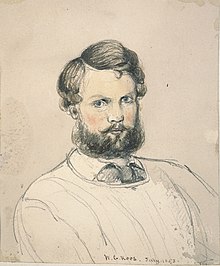William Gilbert Rees
 Self-portrait from July 1853 | |||||||||||||||||||||||||||
| Personal information | |||||||||||||||||||||||||||
|---|---|---|---|---|---|---|---|---|---|---|---|---|---|---|---|---|---|---|---|---|---|---|---|---|---|---|---|
| Born | 6 April 1827 Haroldston St. Issell's, Pembrokeshire, Wales | ||||||||||||||||||||||||||
| Died | 31 October 1898 (aged 71) Blenheim, New Zealand | ||||||||||||||||||||||||||
| Batting | Right-handed batsman | ||||||||||||||||||||||||||
| Relations | George Pocock (grandfather) George Gilbert (cousin) Walter Gilbert (cousin) W. G. Grace (cousin) E. M. Grace (cousin) Fred Grace (cousin) William Lee Rees (cousin) | ||||||||||||||||||||||||||
| Domestic team information | |||||||||||||||||||||||||||
| Years | Team | ||||||||||||||||||||||||||
| 1857 | New South Wales | ||||||||||||||||||||||||||
| Only First-class | 14 January 1857 v Victoria | ||||||||||||||||||||||||||
| Career statistics | |||||||||||||||||||||||||||
| |||||||||||||||||||||||||||
Source: Cricket Archive | |||||||||||||||||||||||||||
William Gilbert Rees (6 April 1827 — 31 October 1898) was an explorer, surveyor, and early settler in Central Otago, New Zealand. He and fellow explorer Nicholas von Tunzelmann were the first Europeans to settle the Wakatipu basin. Rees is regarded as the founder of Queenstown.
Biography[]

Rees was born in Haroldston St. Issell's, Pembrokeshire, Wales in 1827. His father was a commander with the Royal Navy. Rees was educated at the Royal Naval School.[1]
Rees emigrated to New South Wales in 1852, where he became a sheep farmer. He returned to England in 1858 to marry his childhood sweetheart, his cousin Frances Rebecca Gilbert (born November 1838).[1][2]
He established a high country farm in 1860 close to the current location of Queenstown's town centre. His homestead was located near the mouth of the Kawarau River, at the site of the present day Hilton Hotel. Some historic buildings have been preserved.
The Queenstown suburb of Frankton was named after his wife Frances. Cecil Peak and Walter Peak were named after the first given names of his son.
Gold was discovered not far to the northeast two years later, at which point Rees converted his wool shed into a hotel named the Queen's Arms, now known as Eichardt's.[3] Today, Rees is considered the founding father of Queenstown.
Rees was an early New Zealand exponent of the sport of cricket, having been born into a family with prominent links to the sport. He was a member of the Grace family, and related as a cousin to W. G. Grace, an early star of the game. He appeared in one first-class match for New South Wales in 1857; his cousin William Lee Rees played for Victoria in the same match.[4]
Rees was a devout Anglican and helped with the building of St Peter's Church in central Queenstown, which was completed in 1863.[5] The Rees River in Central Otago is named after Rees, and his statue stands on Rees Street, Queenstown, near the town pier. There is a hotel called "The Rees" on Frankton Road in Queenstown which bears his name and a bridge on State Highway 6 named in his honour.[6]
He died in Blenheim, New Zealand, on 31 October 1898,[7] and was buried at Omaka Cemetery.[8]
Gallery[]

Statue of William Gilbert Rees by Minhal Al-Halabi

Plaque on statue of William Gilbert Rees
See also[]
References[]
| Wikimedia Commons has media related to William Gilbert Rees. |
- ^ a b Barry, William Jackson (1897). Past and Present, and Men of the Times. Wellington: McKee and Gamble. pp. 243–245. Retrieved 22 June 2012.
- ^ "Untitled". T and G Brownen. Archived from the original on 4 March 2016. Retrieved 22 June 2012.
- ^ "History: William Gilbert Rees". Experience Queenstown. Retrieved 22 June 2012.
- ^ "William Rees". Cricinfo. Retrieved 22 June 2012.
- ^ "St Peter's Church". Parish of Wakatipu. Archived from the original on 29 April 2012. Retrieved 22 June 2012.
- ^ Caldwell, Olivia (23 May 2012). "Cycle bridge laid for Queenstown Trail". Otago Daily Times. Retrieved 22 June 2012.
- ^ "Obituary". The Press. 1 November 1898. p. 6. Retrieved 1 March 2015.
- ^ "Cemetery records search". Marlborough District Council. Archived from the original on 2 April 2015. Retrieved 1 March 2015.
- People from Queenstown, New Zealand
- 1827 births
- 1898 deaths
- Settlers of Otago
- New South Wales cricketers
- Welsh emigrants to Australia
- Welsh emigrants to New Zealand
- Welsh cricketers
- People of the Otago Gold Rush
- Burials at Omaka Cemetery
- Grace family

